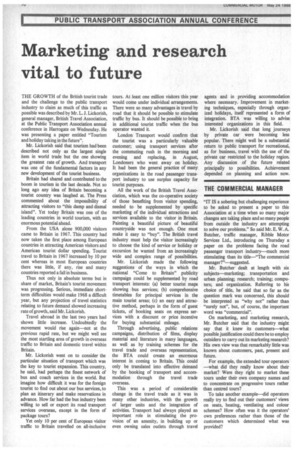Marketing and research vital to future
Page 72

If you've noticed an error in this article please click here to report it so we can fix it.
THE GROWTH of the British tourist trade and the challenge to the public transport industry to claim as much of this traffic as possible was described by Mr. L. J. Lickorish, general manager, British Travel Association, at the Public Transport Association annual conference in Harrogate on Wednesday. He was presenting a paper entitled "Tourism and holiday taking in the future".
Mr. Lickorish said that tourism had been described not only as the largest single item in world trade but the one showing the greatest rate of growth. And transport was one of the fundamental factors in any new development of the tourist business.
Britain had shared and contributed to the boom in tourism in the last decade. Not so long ago any idea of Britain becoming a tourist country was laughed at. The Press commented about the impossibility of attracting visitors to "this damp and dismal island". Yet today Britain was one of the leading countries in world tourism, with an enormous potential ahead.
From the USA alone 900,000 visitors came to Britain in 1967. This country had now taken the first place among European countries in attracting American visitors and American tourist dollar spending. Tourist travel to Britain in 1967 increased by 10 per cent whereas in most European countries there was little, if any, rise and many countries reported a fall in business.
Thus not only in absolute terms but in share of market, Britain's tourist movement was progressing. Serious, immediate shortterm difficulties would make 1968 a difficult year, but any projection of travel statistics relating to future demand showed increasing rate of growth, said Mr. Lickorish.
Travel abroad in the last two years had shown little increase. Undoubtedly the movement would rise again—not at the previous rapid rate, but we might well see the most startling area of growth in overseas traffic to Britain and domestic travel within Britain.
Mr. Lickorish went on to consider the particular situation of transport which was the key to tourist expansion. This country, he said, had perhaps the finest network of bus and coach services in the world. But imagine how difficult it was for the foreign tourist to find out about our bus services, to plan an itinerary and make reservations in advance. How far had the bus industry been willing to sell or export its road transport services overseas, except in the form of package tours?
Yet only 10 per cent of European visitor traffic to Britain travelled on all-inclusive tours. At least one million visitors this year would come under individual arrangements. There were so many advantages in travel by road that it should be possible to stimulate traffic by bus. It should be possible to bring in additional tourist traffic when the bus operator wanted it.
London Transport would confirm that the tourist was a particularly valuable customer; using transport services after the commuting rush in the morning and evening and replacing, in August, Londoners who went away on holiday. It had been the general practice of many organizations in the road passenger transport industry to use surplus capacity for tourist purposes.
All the work of the British Travel Association, which was the co-operative society of those benefiting from visitor spending, needed to be supplemented by specific marketing of the individual attractions and services available to the visitor in Britain. Painting a beautiful picture of beautiful countryside was not enough. One must make it easy to "buy". The British travel industry must help the visitor increasingly to choose the kind of service or holiday or excursion he wanted from an increasingly wide and complex range of possibilities.
Mr. Lickorish made the following suggestions of the ways in which the national "Come to Britain" publicity campaign could be supplemented by road transport interests: (a) better tourist rnaps showing bus services; (b) comprehensive timetables for principal services in the main tourist areas; (c) an easy and attractive method, perhaps in the form of guest tickets, of booking seats on express services with a discount or price incentive for buying substantial mileage.
Through advertising, public relations campaigns, distribution of films, display material and literature in many languages, as well as by training schemes for the travel trade and overseas representation, the BTA could create an enormous interest in coming to Britain. This could only be translated into effective demand by the booking of transport and accommodation through the travel trade overseas.
This was a period of considerable change in the travel trade as it was in many other industries, with the growth of larger units and the integration of activities. Transport had always played an important role in stimulating the provision of an amenity, in building up or even owning sales outlets through travel agents and in providing accommodation where necessary. Improvement in marketing techniques, especially through organized holidays, itself represented a form of integration. BTA was willing to advise interested organizations in this field.
Mr. Lickorish said that long journeys by private car were becoming less popular. There might well be a substantial return to public transport for recreational, as for business, travel with the use of the private car restricted to the holiday region. Any discussion of the future related principally to possibilities. Achievement depended on planning and action now.








































































































































